
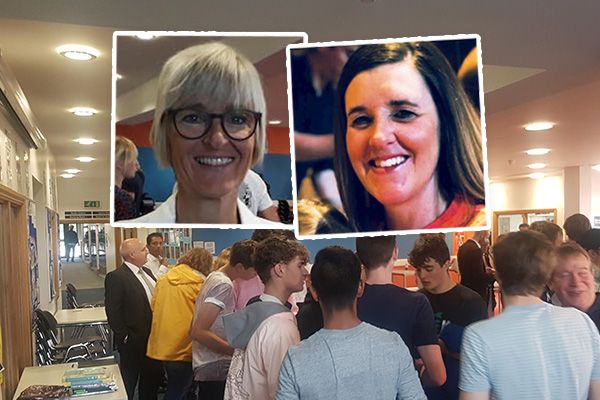
The latest excellent GCSE results for Bailiwick students shouldn't be seen as a reason to fear the new system of secondary education coming Guernsey's way, according to two of the women who will be steering the formation of the so called "two school model."
Grades released this week confirmed that 68.4% of teenagers sitting the exams across Guernsey and Alderney achieved five or more GCSEs, or Level 2 equivalent qualifications, including English and Maths, at grade C or 4 (under the new system) or above.
That average includes all secondary schools in Guernsey, including the three private colleges, as well as St Anne's School in Alderney.
Individually the schools achieved varying pass rates with the colleges on average securing more passes at grades A*-C including English and Maths than the High Schools. 96.5% of students at the Ladies College, 80% of students at Blanchelande College and 95% at Elizabeth College all achieved the so-called golden standard.
At the Grammar School which has a selected cohort of students placed at the school based on their scores at the 11+, 97.6% achieved five GCSEs at grades A*-C or equivalent, including English and Maths. That dropped to 58% at La Mare de Carteret High, 53.1% at Les Beaucamps, 50% at St Annes and 47.3% at St Sampson's High.
No students at Les Voies, which has a much smaller cohort of pupils, achieved five grades A*-C including English and Maths, but 75% of pupils are leaving the school with a minimum of five GCSEs at Grades A*-G or equivalent.
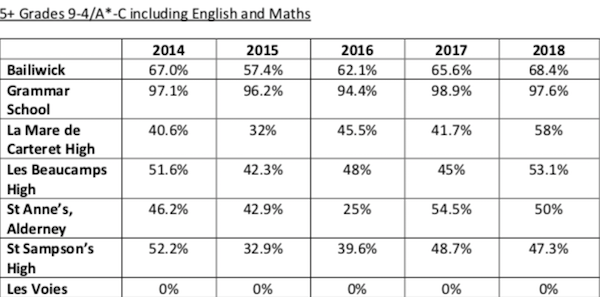
Pictured: The 2018 GCSE results for Guernsey's States run schools based on students achieving five grades A*-C including English and Maths
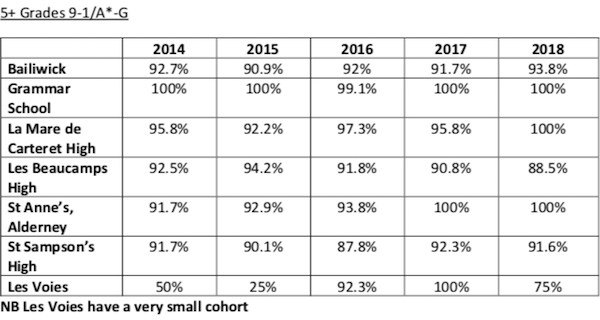
Pictured: The 2018 GCSE results for those pupils achieving five at grades A*-G
Guernsey's system of secondary education is due to change over the coming years meaning the 11+ as a means of selection has ended. Those children starting year seven at island secondary schools and colleges this year are the last to be allocated school places based on selection and from September 2019 onwards all children will attend "all ability schools." The island will see further changes when the number of secondary school buildings is reduced to one school over two sites which will be known as colleges. The three private colleges will remain independent schools and Les Voies and Le Murier schools are expected to continue operating as they currently do.
An announcement on which two school sites will be used for the so called "two school model" of secondary education is expected to be made before the October half term.
The changes to education have also brought about some changes to staffing with the current head teacher of the Grammar School, Liz Coffey, given a new role of Executive Headteacher over the island's secondary schools. The current head teacher of Les Beaucamps, Sophie Roughsedge, is also leaving her school to work for Education Services alongside Andrew Warren who was appointed as Director of Education this year.
Ms Roughsedge told Express she was very pleased with how her pupils at Les Beaucamps performed in their GCSEs this year but she is also really excited for what will happen under the future model of secondary education.
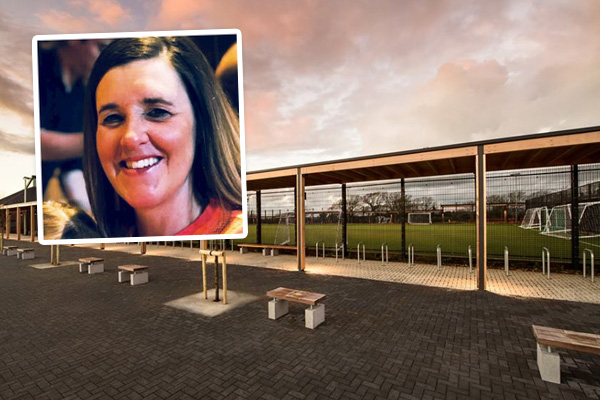
Pictured: Sophie Roughsedge, the current head teacher of Les Beaucamps High School
“[Les Beaucamps' results this year] proves really that selection at 11 doesn’t dictate how well you can do. Personally I think the new system is going to really help to raise the student’s aspirations when it comes to exams because they won’t have already been judged from the outside - as selection does,” she said.
"I really think we will see a big difference when things change, and though it might take a while, it can only be a good thing in the long run."
Ms Roughsedge's comments were echoed by Ms Coffey at the Grammar School who said that under the current system students under her staff were performing well compared to students in the UK, with many making "exceptional progress."
She acknowledged that some people are worried about the performance of local students under the new system or during the transition period but she said it will be her priority to ensure there are no dips in performance.
"We'll have to work to ensure that there aren't any dips in results, and actually, I know that young people at all levels, no matter who they are or where they come from, can achieve, and it's our job to make sure that for Guernsey, and most importantly for them, that this perceived dip...you know, if we think there is going to be a dip, there will be. So we've got to absolutely change the narrative to one of, we're going to ensure that all young people continue to make the sort of progress that they're capable of.
"We're on a mission!"
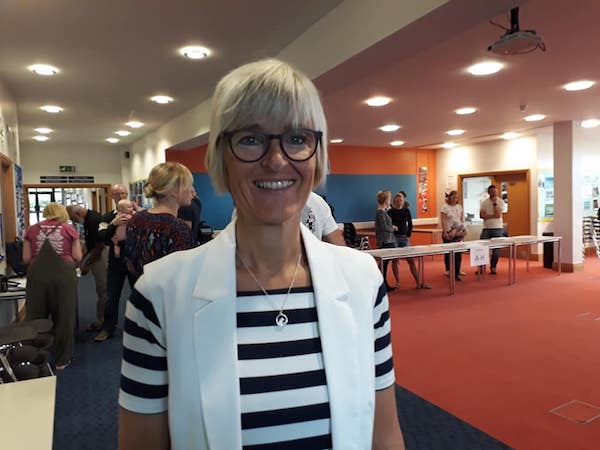
Pictured: Liz Coffey, the current head teacher of the Guernsey Grammar School
Ms Coffey said although she doesn't start her new role as the island's Executive Headteacher until September, the work has already got underway.
"Officially I start on 1 September, but some of the work certainly has been going on. There's a lot to do and I don't underestimate the challenge.
"I know there's been a lot of division in the community about this, and people have been hurt but I think it's time to really try and unite. Sadly, education and health often in all political regimes can be used as political footballs, and what we've all got to remember is that at the bottom of this are young people who deserve us to be united in the cause to really try and make it work."
Comments
Comments on this story express the views of the commentator only, not Bailiwick Publishing. We are unable to guarantee the accuracy of any of those comments.